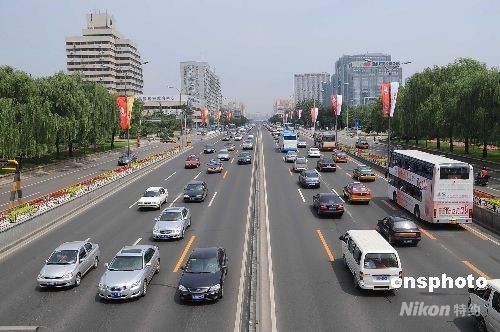Beijing and the neighboring areas may impose stricter measures to curb industrial and vehicle emission in case of serious air pollution during the Olympics, according to China's environmental watchdog.

Beijing, Tianjin, and Hebei Province will expand their current curbs on cars and factories, should meteorological departments foresee an unfavorable air quality induced by "extreme unfavorable weather conditions" in the coming two days, a report on the website of China's Ministry of Environmental Protection said.
Under such circumstances, Beijing would shut down 105 more electric, furniture, building material and chemical plants, halt all construction work, and pull more vehicles off the road.
In Tianjin, 56 more coal-fueled power companies, coal-fired heating projects, building materials, electric and chemical factories would be suspended from production in case of unfavorable air quality forecasts, with cars banned on alternate days according to their odd or even plate numbers.
Similar measure would be carried out in Hebei Province's Zhangjiakou, Chengde, Shijiazhuang, Baoding, Langfang, and Tangshan.
The emergency plan would be terminated after relevant authorities confirm that air quality in the coming two days could meet official standards.
Cleaner air has been Beijing's major concern with the Games pending. The city has been relocating the Shougang Group, one of China's leading steel makers and the city's major polluter, taken half of the city's 3.3 million vehicles off the roads, halted most construction, built more waste treatment facilities and utilized more geothermal resources.
Beijing's neighboring municipality Tianjin and the nearby provinces of Hebei, Shanxi and Shandong, plus the Inner Mongolia Autonomous Region, are also helping the capital to attain its anti-pollution goals by closing major polluters, removing high-emission cars from the roads and restoring grassland vegetation.
Experts have previously claimed that major air pollutants, such as carbon monoxide, carbon dioxide and particulate matter from vehicles have dropped by 20 percent in Beijing year-on-year, thanks to the factory and vehicle use restrictions for the Olympics.
But some Beijing residents and visitors still complained that the city is still covered by mist and fog, despite the fact that the city recorded more "blue sky" days so far compared with the same period last year.
Du Shaozhong, vice director of Beijing Municipal Environmental Protection Bureau, said earlier this week that the rare lack of rain and wind to blow away accumulated emissions was partly to blame, but was optimistic that Beijing's air quality will improve as weather changes.
(Xinhua News Agency July 31, 2008)